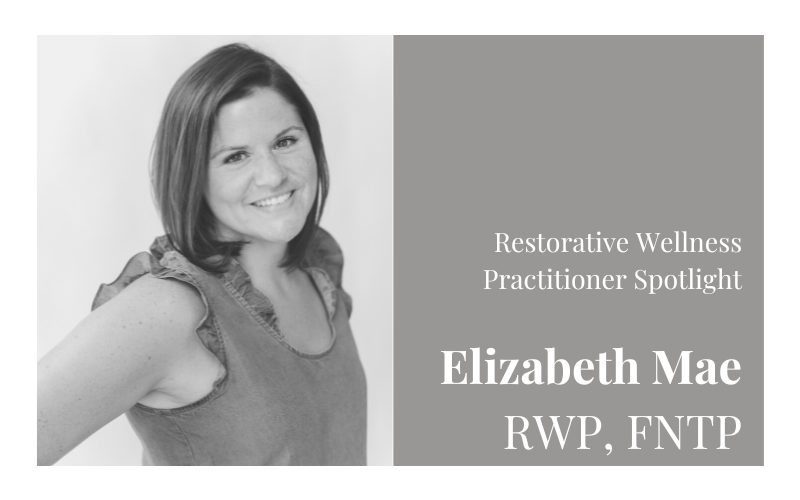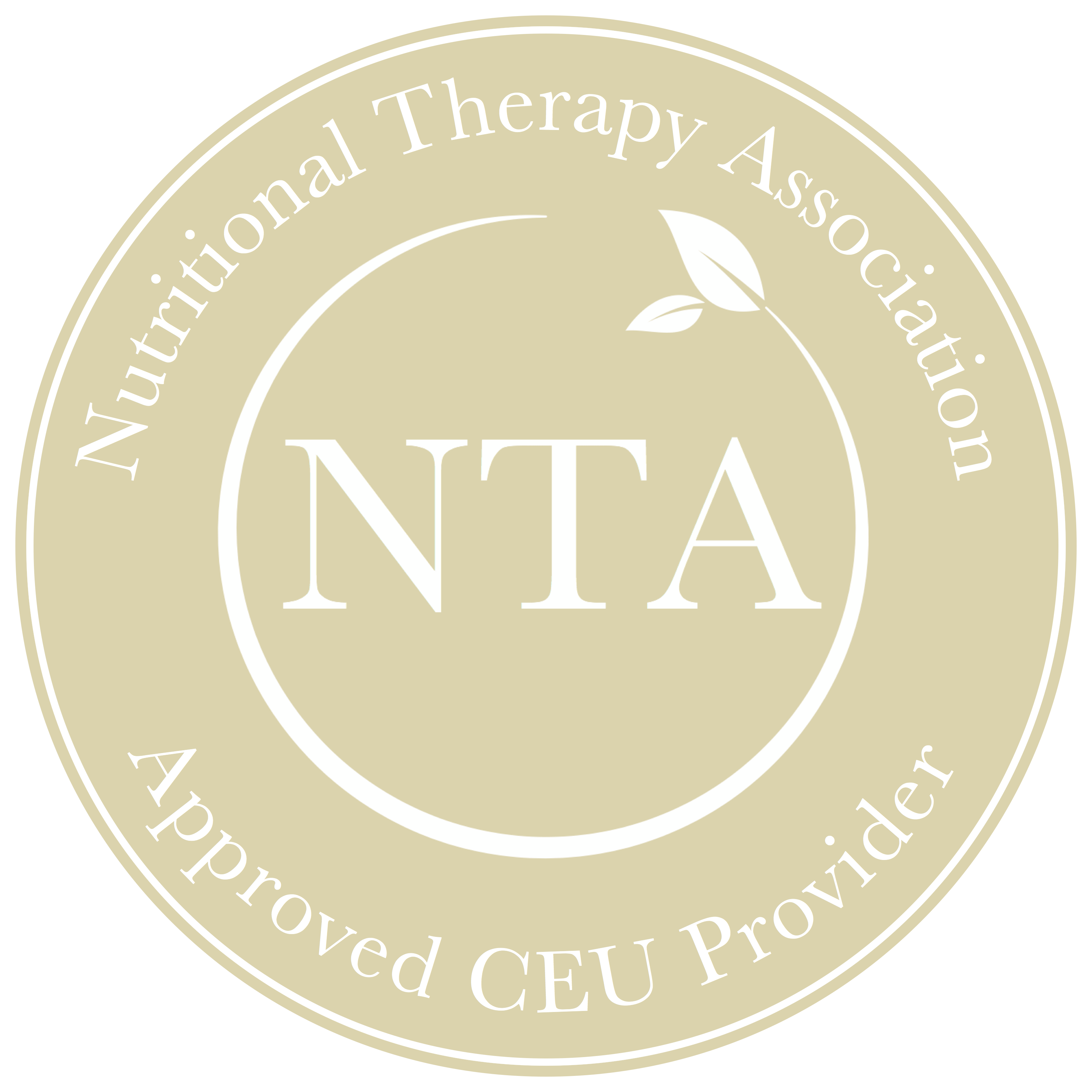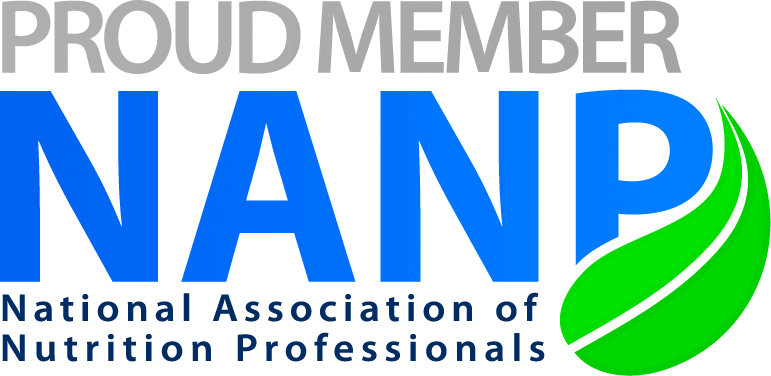Alumni Spotlight with Elizabeth Mae, FNTP, RWP
If you were to ask Elizabeth Mae if she always knew she wanted to help moms and children overcome health challenges through nutrition, her answer would be “No. At least, not back then”.
“Back then”, Elizabeth was a photojournalist. For 17 years, she worked behind a camera documenting major life moments – that is, until she couldn’t anymore.
After the birth of her second son, Elizabeth experienced persistent and unexplained health issues. She lost 80 pounds in the course of two months while nursing her baby. She was constantly dizzy and struggling to function physically. And, she was navigating significant mental and emotional stress as a result of shifts in her personal life.
Despite her rapidly declining health, she struggled to get answers. The doctors she saw didn’t seem concerned and it wasn’t until she started working with an old friend-turned functional medicine practitioner that she was able to make progress in restoring her health. She discovered she was being exposed to mold in her car and, potentially, her home. And, as a result, she was suffering from biotoxin illness which had set off a cascade of autoimmune activity. It was at this point in her journey that Elizabeth became committed to learning everything she could to support her health and the health of others.
BECOMING A RESTORATIVE WELLNESS PRACTITIONER
After working with her functional medicine doctor through a number of healing protocols, Elizabeth reached a point where she was feeling better but felt there was still something missing. She decided to take matters into her own hands and enrolled in the Nutritional Therapy Association’s NTP certification program. Having had no previous medical or health background, the NTA taught Elizabeth the foundational elements of anatomy and physiology as well as basic nutrition principles.
Upon completing the NTA, Elizabeth noticed there were a lot of practitioners going through the NTP program and wondered how she could differentiate herself and stand out. She also uncovered areas of her health that needed deeper healing support, which is what propelled her to enroll in Restorative Wellness Solutions. And, she’s glad she did:
“RWS taught me how to think. It’s allowed me to get so much more out of everything else – every subsequent course I take or book that I read, I get so much more out of it thanks to how RWS taught me to approach complex cases, including my own.”
Currently enrolled in RWS’ Level 4 class The Art & Science of Clinical Mastery, Elizabeth also appreciates how much time she saves thanks to RWS’ approach to curriculum, “The way RWS teaches is systematized and follows the natural healing priorities of the body, which saves you a lot of time and guesswork when you go to put what you’ve learned into practice. Not to mention how much time I save knowing the tests and healing solutions RWS shares have already been vetted.”
CONSIDERATIONS WHEN WORKING WITH PEDIATRIC CLIENTS
Today, Elizabeth specializes in working with moms and children, with pediatric clients representing a large portion of her ever-growing private practice. She’s combined what she’s learned from RWS along with teachings from leaders in the pediatric space, such as Julie Matthews and Natasha Campbell-McBride, to inform her approach in working with children.
When we caught up with Elizabeth, we were fortunate enough to get a peek inside this approach and knew fellow Restorative Wellness Practitioners would be interested, too. Below are the key considerations Elizabeth makes when working with clients who are children:
1. You actually have two clients – parent and child
When working with a family to help restore a child’s health, you may be focusing on the child’s symptom presentation, but your main point of contact is the child’s parent. As a result, you need to think about both parties when developing and delivering recommendations. Elizabeth focuses on educating parents and empowering them to implement sustainable changes at home, noting “If we can arm moms with the right information, we can help kids heal”. Much of the work she does with parents is helping them break associations with “kids foods” and focusing on having the entire family eat whole, nutrient dense foods.
2. When working with kids, less is more
Elizabeth emphasizes that focusing on small, sustainable changes in a child’s diet is key to success. Not only is this less overwhelming for parents, but children respond much more quickly to minor tweaks in the foods they eat. In general, Elizabeth leans into specialized diets to help restore balance in pediatric patients and notes she is much more cautious with supplements, using them only when absolutely necessary. Pro tip: If you do use supplements when working with children, opt for tinctures instead of capsules as they are much easier for kids to consume.
The one exception to this rule? Labs. “I often run more labs with kids than I do with adults – both because I want to eliminate any guessing and because children are not as equipped as adults to verbally communicate their symptoms,” shares Elizabeth.
3. Remember that kids are people, too
Elizabeth stresses the importance of keeping in mind that kids are people, too. “Take the time to think through their experience. What will make them feel safe and supported?”, she shares. Part of this includes teaching parents how to listen and what to look for when it comes to symptoms – “Kids oftentimes have more biofeedback than parents. It’s common for me to have pediatric clients who refuse to eat certain foods that their parents are pushing on them and sure enough they come up red or yellow on an MRT test,” says Elizabeth. Teaching family members how to recognize signs and symptoms can go a long way in facilitating the healing process.
4. Know when you don’t know
Above all else, Elizabeth believes practitioners have the responsibility to know when you need to test to get more information or reach out to other practitioners for additional support. “There are legalities and responsibilities we must respect as practitioners. This is challenging, but it’s part of the important work we do,” shares Elizabeth. She encourages practitioners to build a network of providers to call on when you have questions and not be afraid to be transparent when something falls outside of your scope of practice.
WHAT ELIZABETH WANTS YOU TO KNOW IF YOU’RE JUST STARTING OUT
When asked what she’s most proud of in her work as a practitioner, Elizabeth shared that it is her ability to stick with it and build her business day after day. Getting up early, staying up late, asking the question “Where do people need more support?” and moving in that direction – these weren’t easy things to do, especially with two young kids at home. But, it is this passion and commitment that has propelled Elizabeth to where she is today, which includes a thriving private practice and a growing team of practitioners.
If you’re seeking to build a successful practice like Elizabeth’s, keep these top tips in mind:
Figure out what you’re good at and leave the rest alone: Too often, practitioners try to do all the things. But, focusing on what you’re not good at or don’t enjoy is a waste of time and energy. Instead, get hyper focused on your zone of genius and watch that multiply much more quickly. For all the areas that aren’t your jam – be it social media content creation or supporting clients with hormone imbalances – find partners such as a fellow Restorative Wellness Practitioner that you can reach out to for support.
Invest in learning: Each time Elizabeth has invested in learning and advancing her skills, her business and clients have benefited. “Whether it was through RWS courses or my own self-study into how to translate adult labs to children’s labs, investing time, energy, and money in learning always pays off,” cites Elizabeth. She also recommends going back to the basics when you get overwhelmed – revisit your course materials and take it step by step until you find the missing piece.
Take care of yourself: While most practitioners understand the importance of quality sleep, proper nutrition, and frequent movement, many forget about the regular work needed to support their mental and emotional health. “As a practitioner, you have emotional clients. You need to be able to handle this appropriately – both with a good ‘bedside’ manner to support them and in a way that doesn’t negatively impact your own mental or emotional state,” says Elizabeth. “The three month break RWS gives you in between courses is the perfect time to reinvest in yourself and focus on your own inner work,” she adds.
Looking ahead, Elizabeth is committed to making her work more accessible to families. “There used to be a stat that 1 in 10 children suffered from a chronic health condition. Today, that figure is up to 1 in 2 or 1 in 3. I really want to change this,” says Elizabeth. She’s already taking steps to do just that through her cookbook, Hey Hey Everyday, and her recently launched Mae Day Kits, and looks forward to expanding her team and program offerings to help more families make sustainable changes with success.
If you’re ready to make an impact like Elizabeth, check out our Level 1 class – Mastering the Art & Science of Gastrointestinal Healing. In less than 12 weeks, you’ll gain the skills and confidence you need to get your clients life-changing results.
***
Elizabeth Mae is a Functional Nutritional Therapy Practitioner and Restorative Wellness Practitioner. She runs Hey Hey Mae, a private practice that specializes in helping moms and children heal from chronic conditions such as digestive issues, eczema and other skin issues, and ADHD. You can find Elizabeth on Instagram @heyheyelizabethmae.







